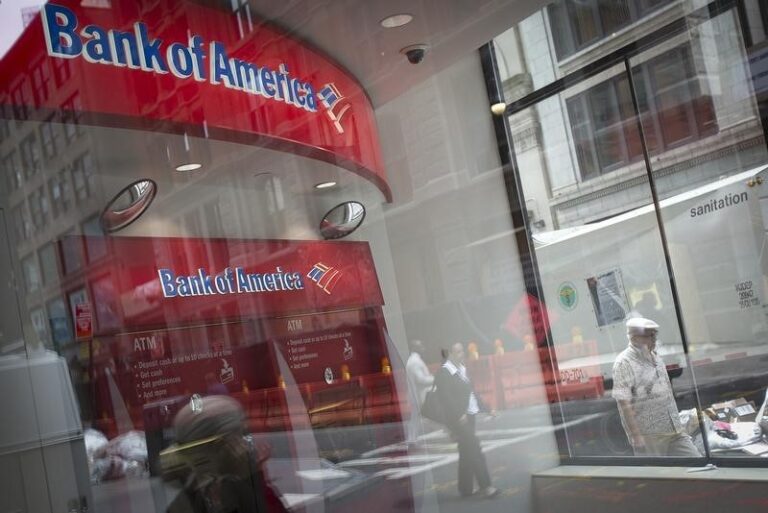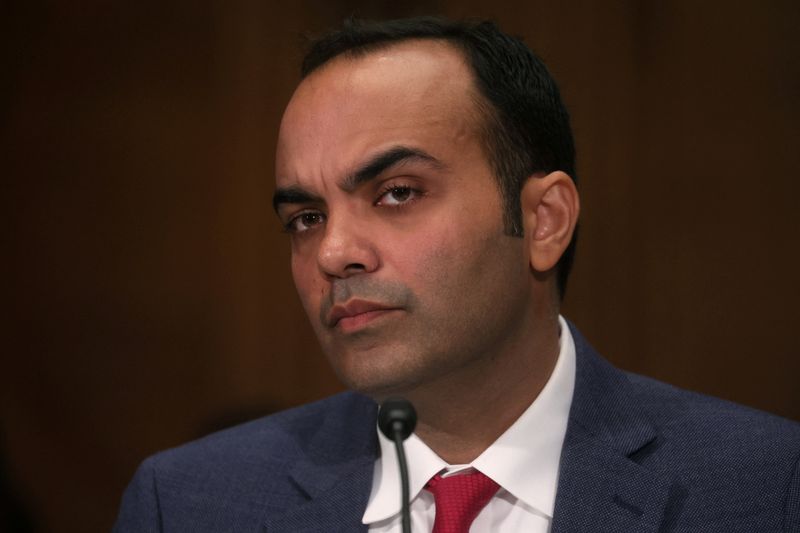
[ad_1]

© Reuters. FILE PHOTO: U.S. Consumer Financial Protection Bureau (CFPB) Director Rohit Chopra testifies before a Senate Banking, Housing and Urban Affairs Committee hearing on “the Consumer Financial Protection Bureau’s Semi-Annual Report to Congress” on the Hill in
By Douglas Gillison
(Reuters) – U.S. lenders hoping for easy merger approvals in the wake of the March banking crisis should instead expect tough scrutiny from regulators worried about financial stability, the director of the Consumer Financial Protection Bureau (CFPB) told Reuters.
Rohit Chopra also said in an interview that the agency was pressing ahead with enforcement efforts despite multiple stays imposed by federal judges on CFPB litigation due to a challenge before the Supreme Court.
“Banks can expect a more rigorous review of applications. The ink on the rubber stamp has dried up and… my hope is to see a shift from the regulators of moving from cheerleader to umpire,” said Chopra, who also sits on the board of the Federal Deposit Insurance Corporation (FDIC), which plays a central role in the bank merger approval process.
Chopra’s tone contrasts with that of Treasury Secretary Janet Yellen and Acting Comptroller of the Currency Michael Hsu, who in recent weeks have seemed amenable to deals to help stabilize the troubled mid-size bank sector, which this year saw three of the four largest-ever U.S. bank failures.
Bank executives, meanwhile, complain that regulators’ foot-dragging and uncertainty caused by looming regulatory reforms have depressed merger activity among healthy banks to historic lows.
“There is no question that past adjudications of mergers did not meet the level of analytical rigor that they ought to have,” said Chopra, declining to cite specific examples.
The sale of the failed First Republic Bank (OTC:) in April to the nation’s largest bank, JPMorgan Chase (NYSE:), allowed the Wall Street giant to get even bigger in spite of a law barring the concentration of more than 10% of the nation’s deposits at a single lender. That drew the ire of Democratic Senator Elizabeth Warren, who helped create the CFPB and backed Chopra for the director role.
Financial reformers in the Democratic Party oppose allowing banks to be “too big to fail.”
JPMorgan last week reported record second-quarter profits, bolstered in part by the First Republic acquisition, which regulators approved under a legal exception for the sale of banks under government receivership and because its bid involved the lowest cost to the government’s deposit insurance fund.
“Certainly there are a number of questions about going forward whether that similar outcome is ideal,” said Chopra, noting there were other bidders beside JPMorgan.
Chopra called in May for the FDIC to adopt changes to bank merger guidelines. He declined to discuss possible changes but said the approval process was already evolving, citing a review of bank merger guidelines undertaken in 2022.
He did note in a recent case that the FDIC had not allowed delays in divestitures aimed at addressing competition concerns or imposing non-compete clauses on staff who might seek work at rival banks.
The CFPB is facing a Supreme Court challenge to the constitutionality of its funding, leading federal judges to freeze at least six of the agency’s 20 pending enforcement cases until the matter is resolved, according to federal court records.
“There’s no question that certain legal uncertainties might lead to more prolonged or protracted litigation,” Chopra said.
“We are continuing to achieve real results in spite of that,” he said, noting recent actions taken against Bank of America (NYSE:), Wells Fargo (NYSE:) and others, “but it certainly doesn’t help.”
[ad_2]